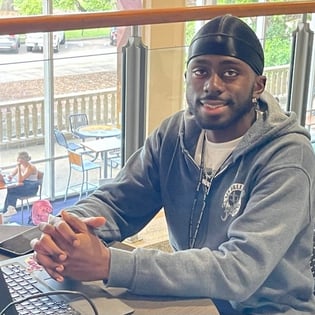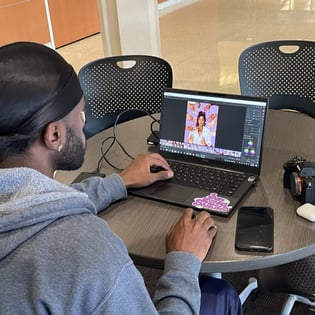Freelance Photographers: Uncovering the new era of photography
Brooke Bell
4/19/20234 min read
When Jenn Ocken first started her photography career in the 1990s, wedding and graduation photoshoots were her bread and butter.
“Around the time when I got started in my career, and really got going in the early 2000s, late 90s, we as photographers were telling a story and getting movement shots,” Ocken said.
Now, 30 years into her career as a freelance photographer, Ocken has noticed a shift in the photography world.
Now, photoshoots have shifted from organically capturing a story into concept shoots with elaborate themes and props.
While these unique concept photoshoots have become common on social media, freelance photographers are adjusting to meet their clients’ wide-ranging requests.
For Kyron Wilson, a freelance photographer and photography student at Louisiana State University, concept photoshoots have been his specialty since starting his business two years ago.
However, his formal training does not always ensure that capturing his clients’ requests will be seamless.
Before a photoshoot, Wilson typically has to strategize capturing his clients’ concepts.
“I sit down a lot of the times in my room, and I call it the ‘think tank,’” Wilson said. “I go over all of my references and inspirational videos I've seen. And then what I try to do is compile like four to five different variations of how I could attack the problem--the problem being the shoot that is.”
Wilson’s creative process is similar to many other freelance photographers. Christopher Brown, the owner of Official Shots, has to learn how to meet his clients’ requests through trial and error.
As a self-taught photographer, Brown often turns to YouTube and other photographers to learn how to incorporate elements like smoke and props into his photography.
“I learn something new every single day,” Brown said. “Which I don't mind because [it] challenges me and I like a good challenge. I'm still learning. I would say I learn [from] YouTube, other videos and other photographers.”
Jordan Hefler, a freelance photographer, has also had to learn how to expand her skills. Hefler began her business in 2014, a few years shy of the shift in photography. She has had to learn how to pivot from simple graduation photos to the concept shoot ideas she receives from clients.
“I mean, school was great to learn the basics and the technical aspects of [photography],” Hefler said. “But so much of what I've done now has just been through experimentation or just having to take an idea and run with it because I got hired to do it.”
The flip side of elaborate concept shoots is the high costs.
Elaborate client requests require photographers to buy the best equipment to produce visually stunning photos. As a result, many freelancers must buy new equipment periodically.
Purchasing new cameras, lights or editing software trickles down to the clients. Freelancers have to balance upgrading their work, while not scaring away potential clients.
“It’s hard to straddle that line of being fair,” Hefler said. “But also, it makes sense. If you go to the doctor and the doctor gets a brand new MRI machine, your bill’s going to cost more because he got newer equipment, right?”
While equipment costs are often the culprit of increasing prices, venue costs also play a role.
Hefler and Ocken are often asked to do photoshoots at wedding halls and plantations, which typically come with hefty photography fees. Both photographers usually charge their clients these fees.
On the contrary, Brown handles these costs differently.
“Usually if it's $10 or $20, I'll pay the expense,” Brown said. “But I have a [photoshoot] in two weeks, and [the client] wants to take them at a hotel. The hotel is really [nice]. But in order to take pictures there, it's $500. So, when it comes to a certain extent, I do tell them that it will be locked in if they pay.”
One change all four photographers have noticed is the amount of time they spend editing.
“I always say this: photography is like 10% taking the pictures, 80% editing,” Brown said.
All four photographers agree that their editing skills have improved due to the sheer fact that they have to edit more.
Brown says that editing his clients’ work weekly can take between four and five hours.
For Hefler, editing is essential when planning her schedule.
“When people want to work with you, you're like, ‘Okay, sure,’” Hefler said. “But then you'll look at your calendar and be like, ‘Oh my gosh, look, I have all this stuff going on. I didn't make any time for myself to edit the photos.’”
Time also comes into play when considering the frequency with which people want professional photos. With more clients wanting photos for more events and sometimes just to post on social media, photographers are booked constantly.
Although it’s steady work for freelance photographers, all four photographers have experienced burnout from their workload.
“Even though I've been doing [photography] for a while, I still struggle with structuring my schedule,” Hefler said. “As a freelance photographer, you are at the mercy of when events are happening or when people are free to shoot. So, you are never going to have a conventional schedule.”
Hefler mentioned that some wedding photographers are booked “every weekend for the next three years.”
While Hefler understands the effects of a hectic work schedule, she and Wilson have also experienced the opposite as business owners.
“When you don't have any bookings, it's hard to keep faith in your work because there's not much work being produced,” Wilson said.
Although the new world of photography has risen expectations for all four photographers, they enjoy the challenge of experimenting with new photos and unique requests.
“When you just look at it as a challenge that I can go ahead and accept and conquer with a different mindset about it, it makes you a little bit more excited to go ahead and attack that shoot,” Wilson said. “Because honestly, if it's not challenging you, why are you doing it?”


